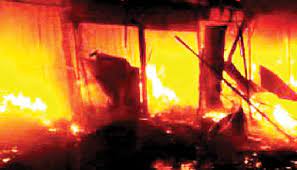
The recent decision by Burkina Faso, Niger, and Mali to withdraw from the Economic Community of West African States (ECOWAS) has intensified the security challenges faced by Nigeria’s military, according to the Chief of the Air Staff, Air Marshal Hassan Abubakar.
Speaking at the first-quarter meeting with branch chiefs, air officers commanding, and commanders in Abuja, Abubakar explained that the withdrawal has severely disrupted regional security frameworks, particularly affecting the operations of the Multinational Joint Task Force (MNJTF).
The MNJTF, a vital force in the fight against Boko Haram and ISWAP, has long been a collaborative effort between Nigeria, Niger, Chad, and Cameroon. However, the withdrawal of these states has left Nigeria to shoulder a heavier responsibility, with the potential exit of Chad further weakening the capacity for joint military operations. Abubakar emphasised that this shift would demand a more agile and robust response from the Nigerian Air Force, particularly as the region’s security dynamics become increasingly complex.
“Given these developments, the burden on Nigeria’s military to support the MNJTF will undoubtedly increase,” Abubakar stated. “We must strengthen operational readiness, enhance inter-agency coordination, and leverage advanced air power to fill the security gaps left by these departing states.”
He further warned that the situation in the Sahel region, already a hotspot for terrorism and insurgency, was deteriorating as extremist groups like Al-Qaeda exploit weak governance structures to expand their influence. Porous borders in the Lake Chad Basin have allowed these groups to sustain their activities, creating a persistent threat to regional stability.
“West Africa’s security landscape remains highly complex,” Abubakar noted, highlighting the growing security threats in the Sahel. “In the Lake Chad Basin, porous borders have enabled terrorist groups to thrive, further destabilizing the region.”
Additionally, the Nigerian Air Force has had to contend with the rising menace of maritime crimes in the Gulf of Guinea, including piracy and illegal oil bunkering. These challenges require increased aerial surveillance and strengthened regional cooperation to curb criminal activities at sea.
On the domestic front, Abubakar commended the progress made in counterinsurgency operations across the North-East and North-West, pointing to improved collaboration between the Air Force and ground forces. However, the rise of the Lakurawa group in the North-West and the resurgence of Boko Haram attacks in the North-East continue to present significant threats. A particularly alarming trend is the increasing use of drones by terrorist groups, such as Boko Haram, which have deployed locally fabricated drones carrying grenades in kamikaze attacks.
“One of the major incidents of 2024 was Boko Haram’s use of drones to attack our troops in Wajiroko, Damboa LGA,” Abubakar revealed. “This highlights the growing efforts by terrorists to adopt drone technology in their attacks.”
In response, Abubakar emphasized the urgent need for a comprehensive anti-drone defense system to protect military personnel and assets from such attacks.
In contrast to these challenges, there have been notable successes in Nigeria’s South-East and South-South regions. In the South-East, military operations have significantly reduced secessionist attacks, while in the South-South, sustained aerial surveillance under Operation Delta Safe has helped reduce crude oil theft and illegal bunkering. As a result, Nigeria’s oil production saw a remarkable increase of over 13% in the last quarter of 2024, compared to the same period in 2023.
Maj. Gen. Adamu Laka, the Coordinator of the National Counter-Terrorism Centre, echoed concerns about the growing confidence of terrorist groups, warning that their recent successes had emboldened them to expand operations into coastal West Africa, including Benin Republic.
“As member countries face increased threats from extremists across the northern borders, the need for a stronger security mechanism becomes even more urgent,” Laka said during the Regional Seminar on Strengthening Capacities for the Implementation of the Accra Initiative. “Terrorism thrives in ungoverned spaces and porous borders, and stronger regional security cooperation is essential to prevent the southward expansion of terrorism.”
Maj. Gen. Richard Gyane, Commandant of the Kofi Annan International Peacekeeping Training Centre, further emphasized the alarming rise of terrorist activities in the Sahel. Between 2007 and 2023, the percentage of global terrorism-related deaths in West Africa surged from 1% to 43%. Extremist groups have expanded from Mali into Burkina Faso, now accounting for 58% of all violent extremist attacks in the Sahel.
“This expansion is now reaching littoral countries like Côte d’Ivoire, Benin, and Togo, with the potential to spread to Ghana,” Gyane warned. He also highlighted the role of organized crime, including arms trafficking and illicit trade in natural resources, in fueling the spread of terrorism across the region.
With terrorism on the rise and regional security frameworks under strain, the need for greater collaboration and adaptive military strategies in West Africa has never been more critical. As Nigeria continues to face these growing security challenges, it will require a concerted, multi-national effort to combat the spread of terrorism and stabilize the region.





